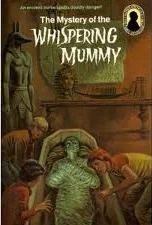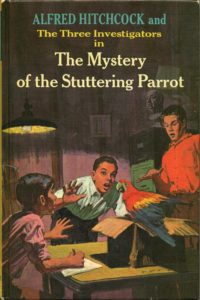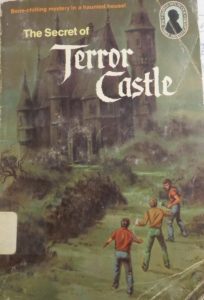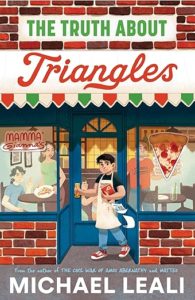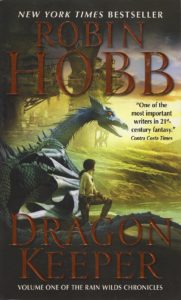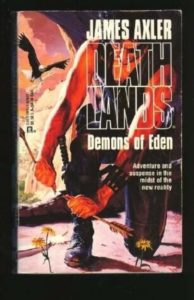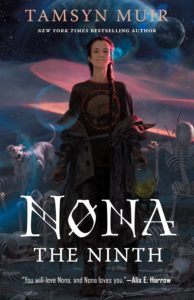 Some years back, there was a real time release version of Bram Stoker’s Dracula, by which I mean the person who ran it looked at all the dates of the diary entries and and letters and whatnot, and emails followed with the information from those dates, on those dates. I missed that, but it sounded pretty cool, and later when our group of friends did a similar re-read of Freedom and Necessity, I liked that enough that I took the plunge on yet another guy’s read of Moby Dick. That one is less explicitly dated in most places, so I think he more or less made up the schedule as he went along, but still, Ishmael’s journey does cover a goodly span of time; if two years sounds right to you, then hooray!
Some years back, there was a real time release version of Bram Stoker’s Dracula, by which I mean the person who ran it looked at all the dates of the diary entries and and letters and whatnot, and emails followed with the information from those dates, on those dates. I missed that, but it sounded pretty cool, and later when our group of friends did a similar re-read of Freedom and Necessity, I liked that enough that I took the plunge on yet another guy’s read of Moby Dick. That one is less explicitly dated in most places, so I think he more or less made up the schedule as he went along, but still, Ishmael’s journey does cover a goodly span of time; if two years sounds right to you, then hooray!
A thing I forgot to mention but which is perhaps obvious from context clues is, I’ve never read this book. I was scared off of it at a young age by people telling me there’s hardly any interactions with the eponymous whale, and that instead most of the book is Melville explaining the whaling industry. More on that later, but I can say that this book is oddly paced, and not because it took me nearly two years to read it.
In the first act (let’s say), Ishmael[1] was bored and listless in Nantucket and looking for a job on a whaling ship. This part is surprisingly heartfelt, and snarkily hilarious, in part because… here I will just admit I’m not going to worry about spoilers for a 175 year old book, so consider yourself warned. In large part, I was saying, because he’s clearly unqualified for the job. But he meets and instantly forms a bond (see heartfelt above) with Queequeg, who is a Pacific Islander of some extraction or other[2], and Queequeg is a harpooner of substantial skill, with the results being that Ishmael rides his coattails onto the Pequod, a boat captained by one Ahab, about whom we spend the rest of act one hearing various dark portents and omens and foreshadowings.
In the second act, Ishmael introduces us to the three captain’s mates and the two or three other harpooners (all alike noble savages, because the thing about sports existed even then I guess) and life on the boat, I suppose because he’s experiencing it as we are. Here we also learn that Ahab’s missing leg is due to a fight with an albino sperm whale who is famous enough to have acquired a name among the whaling brotherhood, and that Ahab is less interested in bringing home as much sperm oil as possible[3] and more interested in finding that particular whale, and, you know, winning round two. If you’re thinking that Rocky II should never have been made and this has the same energy, well, you’re half right.
In the third act, which is the meat of the book (no pun), the ship sails into the Pacific to hunt some whales. Here, Melville gives up all pretense that Ishmael is not actually him, and sets to describing the American sperm whaling industry in exhaustive and gory detail, including the differences from other nations and other whale types. He describes a hunt and a cleaning and a disposal from beginning to end, including an almost but not quite slapstick scene in which someone falls into a whale whilst it is hung to be processed. He waxes rhapsodic about his plans to categorize all whales amongst the other fish of the sea, and bemoans his inability to truly explain the fearsome, awesome scope of what a whale truly is, up close and personal, neither alive nor dead.
All this is interspersed with various stories of the sea, both his own experiences and what he hears from others along the way, I suppose to show passage of time and remind people that this is in fact a narrative. The odd thing is, yes, I said it was an exhaustive survey of the whaling industry, but what it never is, is exhausting. I would not have expected to find anything of interest in a historical oddity that is abhorrent to anyone who has seen Star Trek IV or who cares in any other way about other highly intelligent species. Nevertheless, it was engrossing. I think this may be a sign that I’m old?
In the fourth and final act, the action picks up for nearly the first time since Ishmael set foot on the boat. The odd part is, after having talked to the reader about all his grandiose plans to correctly taxonomize the various whales and of his struggles to convey the truth of them, he all but disappears into the woodwork as the story nears its climax. Now everything is about the crew slowly being stretched tauter and tauter by Ahab’s monomania, plus more signs and portents about the inevitable conclusion. His return to the narrative in the denouement is written as an offhanded afterthought.
So, going back to my point above: seriously weird pacing, not just from a narrative perspective, but from the perspective of Melville’s intentionality about what the book should actually be. I still liked it, so I suppose I cannot say he failed despite my bewilderment on this point; and having actually read the book definitely does elevate Star Trek II above even what that scene meant without the full context, which I would not have expected, honestly.
In the scope of 19th century American literature, you could do a lot worse! I’m still surprised by just how funny the book was.
[1] Rebecca Black’s inspiration
[2] It is clear throughout the book that Melville is enlightened on the subject of race, as compared with his 1851 American peers in general, but he is nevertheless a white dude from 1851, and concerns himself little with such niceties as whether people from different places are in fact much different from one another.
[3] I wonder as to Ayn Rand’s opinion on Ahab’s anti-capitalist sensibilities.
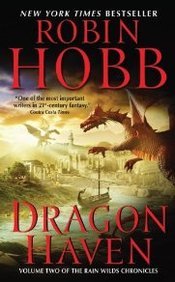 Longer ago than I’m happy about[1], I read the first Rain Wilds book, continuing Robin Hobb’s Elderlings Fantasy Universe. At the time, I thought it served mostly as a book-long prelude and character introduction for a forthcoming trilogy, plus maybe the first two chapters of the actual first book. On the one hand, I sort of stand by that. On the other, having read this book, I could easily consider it the concluding chapter of a duology instead.
Longer ago than I’m happy about[1], I read the first Rain Wilds book, continuing Robin Hobb’s Elderlings Fantasy Universe. At the time, I thought it served mostly as a book-long prelude and character introduction for a forthcoming trilogy, plus maybe the first two chapters of the actual first book. On the one hand, I sort of stand by that. On the other, having read this book, I could easily consider it the concluding chapter of a duology instead.